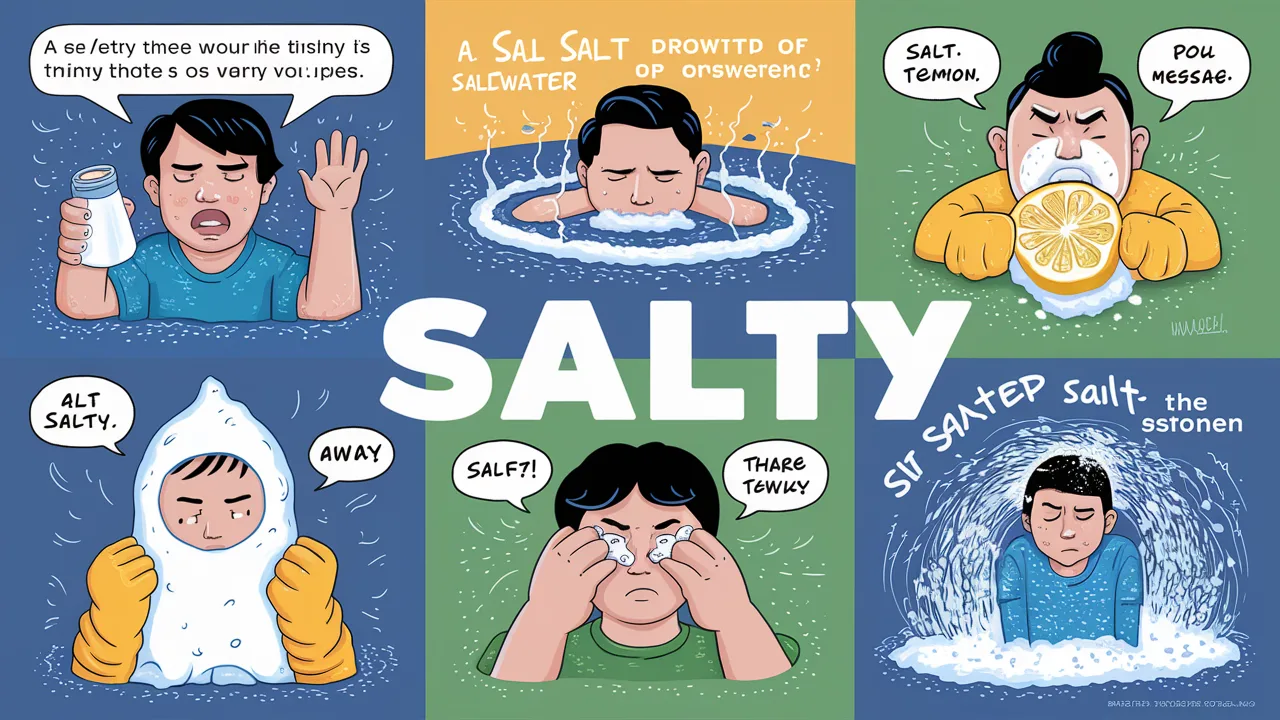The term “salty” can take on several different meanings in the context of texting and online communication. Here are 7 ways it is commonly used:
- Angry or upset: When someone is described as “salty,” it often implies they are angry, upset, or bitter about something
. For example, “Don’t be so salty just because you lost the game.” Bitter or resentful: Similar to being angry, “salty” can also mean someone is feeling bitter or resentful, usually over a perceived slight or injustice.
“She’s been salty ever since her ex started dating someone new.” Rude or disrespectful: A “salty” person in texting lingo may also be someone who is rude, disrespectful or antagonistic in their communication.
“Don’t send me salty messages just because I didn’t reply right away.” Exaggerated or over-the-top: In some contexts, “salty” can mean something is exaggerated, over-the-top or dramatic.
“She’s being so salty about her broken nail, it’s not even that bad.” Unpleasant or distasteful: When applied to a situation or experience, “salty” can imply it is unpleasant, distasteful or disappointing.
“Sitting in traffic for 2 hours was such a salty way to start the day.” Flirtatious or suggestive: In a flirtatious context, “salty” can take on a more playful, suggestive meaning.
“Your text was a little salty, are you trying to tell me something?” Impressive or cool: Surprisingly, “salty” can also be used positively to describe something impressive, cool or desirable
- . “That new car is so salty, I wish I could afford it.”
So in summary, while “salty” usually has negative connotations in texting, it can also be used in a more playful, positive or exaggerated way depending on the context. The meaning is often conveyed through the tone and phrasing around the word.
Language, the ever-changing tapestry woven by human communication, constantly adapts to societal shifts and technological advancements. In the digital age, this evolution is particularly evident in how phrases undergo metamorphosis within the realm of text-based conversations.
Among these linguistic shape-shifters stands the term “salty,” a prime example of lexiconic evolution in modern digital discourse. Initially rooted in describing taste, “salty” has now sprouted numerous branches, each bearing distinct connotations and semantic nuances when utilized in online interactions.
As we embark on a journey through these lexical tributaries, we delve into the multifaceted meanings that “salty” assumes in the texting domain. With millennials and Gen Z at the linguistic helm, this seemingly understated word emerges as a vessel carrying various interpretations reflective of contemporary digital culture.
From conveying bitterness to exuding confidence and sassiness, “salty” demonstrates its prowess as a chameleon-like term capable of embodying divergent emotions and attitudes with just a few keystrokes.
Join us as we navigate through the linguistic landscape where familiarity meets innovation, shedding light on how words like “salty” morph their identities to mirror our ever-evolving modes of expression.
Salty as a Flavor Metaphor.
Originating from the taste of salt, the term “salty” has evolved beyond its culinary roots to encapsulate emotional nuances in online communication. Initially used to describe the literal taste of salt, “salty” gradually transitioned into a metaphor for displaying bitterness or resentment in someone’s demeanor.
In modern texting parlance, this evolution remains evident as individuals use “salty” to convey feelings of being upset or harboring ill-will towards others within the digital realm.
For instance, imagine a scenario where an individual engages in a heated discussion on social media but receives criticism that they perceive as unfair. Instead of responding diplomatically, they might reply with “Why are you getting so salty?” signaling not just irritation at the comments received but also implying that the other party is exhibiting signs of bitterness or resentment.
This subtle shift in meaning showcases how language adapts and expands its connotations to capture complex emotional states succinctly, mirroring the multifaceted nature of human interactions even in virtual spaces.
Moreover, the idea of being “salty” has transcended mere description and morphed into an efficient tool for expressing discontent or displeasure without extensive elaboration.
By simply labeling someone’s behavior as “salty,” individuals can convey a spectrum of negative emotions – from mild annoyance to deep-rooted resentment – in a concise and universally understood manner within the context of online dialogues.
This linguistic versatility underscores how adaptable language is in accommodating new meanings and reflecting contemporary attitudes towards communication styles shaped by digital platforms.
Salty as Slang for Jealousy.
Among millennials and Gen Z, the term “salty” has taken on a new role in digital communication to encapsulate feelings of jealousy or envy. On social media platforms such as Twitter and Instagram, users often employ “salty” to express their discontent or resentment towards others who may have achieved something they desire.
For instance, a user might comment “Feeling salty because I didn’t get invited” on a friend’s post showing a fun gathering that they weren’t part of, showcasing how the term has evolved to connote underlying feelings of jealousy.
Moreover, the rise of influencer culture has contributed to the popularization of using “salty” in contexts where individuals covet aspects of someone else’s life portrayed on social media. It is not uncommon to come across captions like “Feeling extra salty seeing her vacation pics” under travel photos shared by influencers.
This shift in meaning reflects how language adapts to the nuances of digital interactions and allows users to succinctly convey complex emotions like jealousy within limited characters or captions.
What differentiates this contemporary usage from its traditional connotation tied to flavor is the swift adaptation of “salty” into the lexicon of online discourse as shorthand for sentiments related to envy.
By analyzing these linguistic nuances within social media interactions, we gain insight into how words undergo semantic mutations within specific communities, creating rich layers of meaning that resonate with younger generations navigating the complexities of modern communication channels.
“Salty” in the realm of text conversations.
“Salty” in the realm of text conversations has transcended its original flavor metaphor and evolved to signify a sense of attitude or sass. When someone describes another as “salty,” it often implies a witty or sarcastic demeanor that adds an edge to online dialogues.
This usage of “salty” reflects a playful form of banter where individuals use the term not only to convey humor but also to assert their quick wit and clever comebacks in digital interactions.
For instance, in response to a teasing comment about being too competitive in an online game, one might reply with, “Just because I’m winning doesn’t mean you have to get salty about it.”
Exploring the nuances of employing “salty” in this context reveals how it serves as a tool for individuals to inject personality into their messages. Adding a hint of sarcasm or sass through the term can enhance the conversational tone and even foster more engaging exchanges between users.
Whether used as a lighthearted jab among friends or as a way to playfully challenge someone’s viewpoint, the adaptability of “salty” in signaling sassy undertones showcases its versatility as a linguistic marker in digital communication. In essence, incorporating “salty” within texts often amplifies the dynamics of conversations and contributes to creating more vibrant online discourse.
The evolution of “salty” from describing jealousy or resentment to embodying sassiness illustrates how language adapts to suit contemporary communication styles. By embracing this new facet, individuals now wield “salty” not just for expressing negative feelings but also for infusing conversations with humor and light-hearted banter.
This shift highlights how modern slang continues to redefine itself within digital spheres, offering users diverse ways to convey emotions and attitudes through concise yet impactful expressions like “salty.”
Ultimately, using “salty” in text conversations allows speakers not only to communicate specific tones effectively but also grants them the freedom to showcase their wit and attitude in a succinct manner that resonates well with today’s fast-paced online interactions.
Salty Representing Displeasure Online.
In the realm of online communication, the term “salty” has transcended its culinary origins to convey feelings of discontent and annoyance. When individuals describe someone as being “salty” in digital spaces, they are often highlighting a state of disgruntlement or frustration.
This usage has become prevalent in comment sections of social media platforms, where users may express their displeasure with a post or discussion by labeling others as “salty.” For example, in a heated debate over a controversial topic on Twitter, one user might respond to criticism with the remark, “Why are you so salty about my opinion?”
Moreover, online forums and gaming communities frequently witness the deployment of “salty” as a descriptor for negative sentiments. In gaming environments, players may use the term to tease rivals who display irritable behavior after losing a match.
The versatility of this slang term allows it to efficiently encapsulate the myriad expressions of online disapproval without resorting to lengthy explanations. By simply stating that someone is being “salty,” individuals can signal their dissatisfaction concisely and effectively in digital interactions.
The contextual nature of the word in expressing displeasure online also extends beyond individual interactions to broader community dynamics. On platforms like Reddit or Discord, where discussions can quickly escalate into disagreements or conflicts, participants might label an entire group as “salty” when encountering resistance to certain ideas or changes.
This collective attribution helps create an atmosphere where dissent is not only acknowledged but also somewhat normalized through the shared understanding conveyed by this shorthand terminology.
Salty, once synonymous with bitterness or resentment.
Salty, once synonymous with bitterness or resentment, has undergone a linguistic metamorphosis among today’s youth. Contrary to its negative connotations, “salty” now serves as a marker of resilience and confidence in digital interactions. This shift showcases how language evolves to reflect changing social dynamics and attitudes.
By embracing “salty” as a term denoting assertiveness and self-assurance, millennials and Gen Z are redefining its significance within the digital lexicon.
The evolution of “salty” from a derogatory label to an empowerment tool signifies a broader cultural shift towards embracing authenticity and self-confidence online.
Rather than cowering from adversity or criticism, individuals flaunt their saltiness as a badge of honor, embodying strength in the face of challenges or setbacks. For instance, when faced with cyberbullying or negative comments, responding with humor and confidence can be seen as being “salty” in a positive light.
This reinterpretation of “salty” aligns with the overarching theme of reclaiming words and concepts that were previously associated with negativity. The deliberate choice to transform the meaning behind “salty” speaks to the agency wielded by younger generations in shaping their digital identities.
By imbuing this term with qualities such as resilience and confidence, users subvert traditional expectations placed upon them, heralding a new era where expressions of self-assuredness are celebrated rather than suppressed in online discourse.
Salty: A Reflection of Online Culture.
Slang terms like “salty” serve as linguistic mirrors reflecting the complexities of online culture. The term’s evolution from describing bitterness to showcasing resilience exemplifies how digital interactions redefine language within the realm of social media and messaging platforms.
The socio-cultural implications embedded in the use of “salty” shed light on modern communication norms, where emotions are often expressed through unconventional vocabulary that resonates with younger generations.
For instance, a subtle shift has occurred where being labeled as “salty” may not only signify annoyance but also connote assertiveness and confidence in one’s convictions within the virtual sphere.
The adoption and adaptation of phrases like “salty” demonstrate a deep-seated connection between language and social behaviors in the digital age. Linguistic shifts such as these not only influence individual expression but also mold collective understanding and interaction patterns online.
By examining how “salty” is embraced across various online communities, one can decipher underlying power dynamics, emotional nuances, and cultural references embedded in contemporary discourse.
This phenomenon encapsulates a larger trend where words become vessels carrying intricate layers of meaning shaped by technological advancements and societal values.
Moreover, the widespread usage of “salty” underscores a broader narrative about the democratization of language within diverse digital spaces.
As individuals from different backgrounds adopt this term to articulate their sentiments, it becomes evident that linguistic innovations mirror inclusive communication practices prevalent on social media platforms.
Through analyzing how “salty” navigates through online cultures, one can witness how language serves as both a reflection and a catalyst for evolving norms, fostering dialogue, empathy, and identity formation among diverse online communities.
Conclusion: The Fluidity of Language Evolution.
In conclusion, the transformation of the term “salty” in texting exemplifies the dynamic nature of language evolution. From its origins as a flavor metaphor to its contemporary expressions of jealousy, sassiness, displeasure, resilience, and confidence online, “salty” showcases how words adapt and evolve within different generations and technological landscapes.
The fluidity with which language morphs its meanings across time reflects the ever-changing societal attitudes and communication norms prevalent in today’s digital era.
Emphasizing the malleability of linguistic expressions like “salty,” we witness how words transcend mere definitions to encapsulate broader socio-cultural shifts. As new communication platforms emerge and social interactions evolve online, language continues to serve as a mirror reflecting contemporary values and behaviors.
This evolution highlights not only the adaptable nature of language but also its pivotal role in shaping our digital interactions and influencing the way we express emotions and opinions in the modern age.



